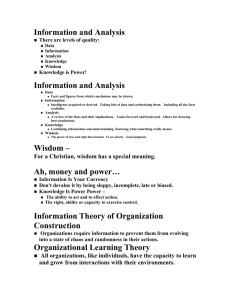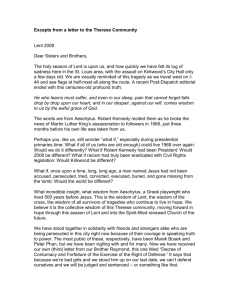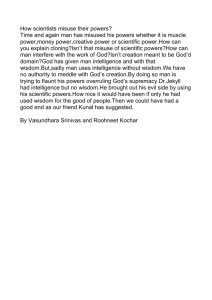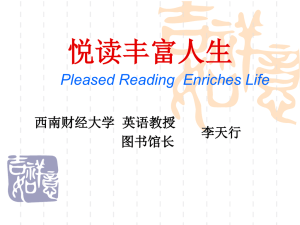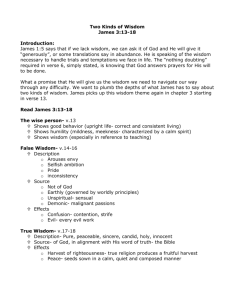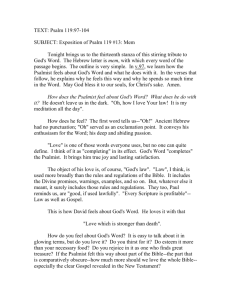Wisdom, Management, and Organization
advertisement
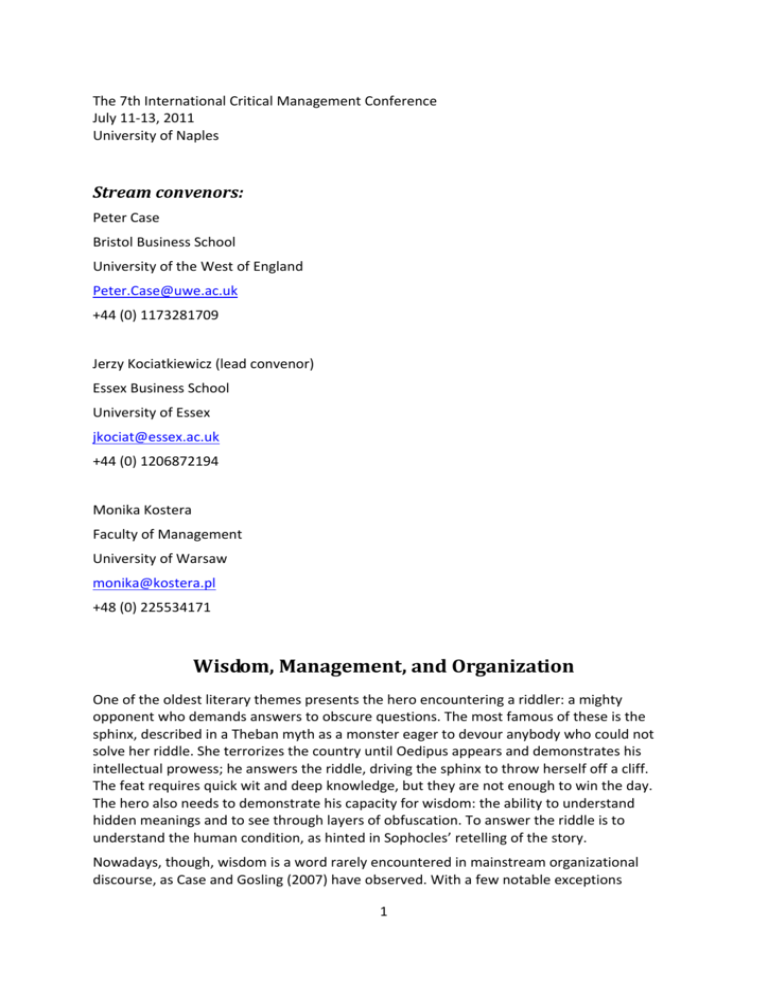
The 7th International Critical Management Conference July 11‐13, 2011 University of Naples Stream convenors: Peter Case Bristol Business School University of the West of England Peter.Case@uwe.ac.uk +44 (0) 1173281709 Jerzy Kociatkiewicz (lead convenor) Essex Business School University of Essex jkociat@essex.ac.uk +44 (0) 1206872194 Monika Kostera Faculty of Management University of Warsaw monika@kostera.pl +48 (0) 225534171 Wisdom, Management, and Organization One of the oldest literary themes presents the hero encountering a riddler: a mighty opponent who demands answers to obscure questions. The most famous of these is the sphinx, described in a Theban myth as a monster eager to devour anybody who could not solve her riddle. She terrorizes the country until Oedipus appears and demonstrates his intellectual prowess; he answers the riddle, driving the sphinx to throw herself off a cliff. The feat requires quick wit and deep knowledge, but they are not enough to win the day. The hero also needs to demonstrate his capacity for wisdom: the ability to understand hidden meanings and to see through layers of obfuscation. To answer the riddle is to understand the human condition, as hinted in Sophocles’ retelling of the story. Nowadays, though, wisdom is a word rarely encountered in mainstream organizational discourse, as Case and Gosling (2007) have observed. With a few notable exceptions 1 (Rooney & McKenna, 2007), wisdom’s absence from management curricula is conspicuous, and it is certainly not among the qualifications sought for in managerial CVs. Knowledge, on the other hand, appears promiscuously in popular management discourse; enthusiastically embraced by theorists, consultants, and practitioners alike. Since the famous HBR publication by Ikujiro Nonaka, knowledge management (KM) has been the topic of the day, being studied, implemented, invoked and desired by many authors and actors (Nonaka, 1991). Despite acknowledging the role of tacit knowledge, Nonaka’s emphasis is still on the codification (externalization) and communication (socialization and internalization) of such knowledge. In practice, this has been widely interpreted as involving the use of information technologies to facilitate objective and objectifying shared understandings. Several critics of Nonaka’s and related technology‐led approaches to KM have pointed to the limitations of seeking to codify tacit knowledge and constraints which ICTs, owing to their calculative configuration, invariably introduce (Blackler 1995; Cabrera and Cabrera 2002; Thompson and Walsham 2004; Tsoukas and Vladimirou 2001). In short, naïve resource‐based understandings of organizational knowledge upon which KM is predicated carry certain risks. They may simply be ineffective and unable to deliver on their promises thus representing a waste of capital investment on ICT equipment and training, or, in more serious cases, result in counterproductive interventions that actually damage extant practices. So KM, we contend, does not entail or imply an increase in organizational wisdom. As Jemielniak and Kociatkiewicz (2009) observe, knowledge workers are presented as ‘valuable assets’ of contemporary organizations but are, as a direct consequence, subject to intensive manipulation and often suffer from overwork and burnout. The word ‘knowledge’ is used without regard to the context which gives the impression of it being another fad or a sheer triviality (Case & Gosling, 2010; Thompson & Walsham, 2004). At the same time, macro‐ economic and cultural trends seem to indicate knowledge work as a defining feature of the contemporary economy. Knowledge management is, then, not a fad, but a serious trend – it represents for professionals what Taylorism represented for workers. Wisdom can be understood as knowledge embedded in social context and thus knowledge management, seeking to control and limit the autonomy of employees in possession of knowledge, reduces the possibility of wisdom manifesting in organizational settings. As wisdom is never divorced from its context, it is always bound to its bearer. The Sage, Or the Senex, is one of the key Jungian archetypes, and refers to the role of wisdom in human life (Jung 1966 [1938]). The Senex is an older person of either or indeterminate sex, represented in legends and myths as a sage, oracle, prophet, wizard, witch, crone, wise man or wise woman. The Sage is at times a mystic, usually someone beyond the everyday aspirations and orders of society; able to offer advice, open minds, and turn taken for granted truths on their head. His or her wisdom is often subversive, it challenges the established ways and points to the ways less traveled. The Sage is often somewhat distracted, not quite of this world, perhaps as stranger or a foreigner. He or she possesses knowledge that is central for the quests of younger characters. However, the Senex does not pursue the quests of the young him‐ or herself, but lets them grow up and leaves them to their pursuits. There is an abundance of famous cultural representations of this archetype, some based on real people, like Solomon, and some purely fictional, like Merlin; some anarchic outsiders, like Granny Weatherwax and some formal leaders of organizations, like Albus Dumbledore; some good, like Gandalf and some corrupt, like 2 Saruman; some earthy and mortal, like Socrates and some transcendent and divine, like Sophia. In this stream we would like to invite contributors to reflect on the variety of roles the archetypes of wisdom have to play in contemporary organizations, especially in work organizations. As for other attributes of the Senex in current mainstream management discourses, advice is, and has been at least since the times of Frederic Taylor, a quite consistent theme, usually placed in between theory and practice. Consultants are often referred to as management gurus, however, not because of the subversive wisdom, helping practitioners to transcend their everyday realities, but rather because of the almost religious zeal with which they express their teachings, which are placed quite solidly within the mainstream management culture (Huczynski, 1996 [1993]). Such gurus can support managers in relating to problems they perceive as valid and real and help them feel good about themselves. But they rarely if ever advise to transform, transcend, undermine, their aim being to bring new sellable management ideas into fashion (Huczynski, 1996 [1993]; Furusten, 1999). In that they often remind of the advising style of Niccolò di Bernardo dei Machiavelli (2007 [1932]) rather than that of King Solomon: it promises more power in exchange for money and/ or fame, and not the maturation and individuation of the one who is seeking advice. What does mainstream management need wisdom for, if at all? We believe and maintain firmly that it does, not least because it offers a language and a mindset for practitioners to approach things that are important in their everyday work and which they currently lack the means to engage with. Case and Gosling (2007) present an ethnographic study of an executive’s work, which reveals how intensively present virtues, ethical dilemmas and moral experiences are in the everyday work of a manager. They propose the reinvention of philosophy, in particular the stoic philosophy for everyday use of managers. It would promote the pursuit of wisdom as part of their everyday engagement with the world, and give them a way to relate to an important and helpful archetype. This stream invites papers which explore but are not limited to the following areas: The role of wisdom traditions in critical approaches to management and organization studies. Western wisdom traditions and CMS. Wisdom as archetype in management and organization theory/practice. Non‐western wisdom traditions and CMS. Wisdom and organizational ethics. Wisdom, identity and self‐management. Wisdom and leadership. The role of the sage in or outside the organization. The wisdom/knowledge management relationship. Personal knowledge management as wisdom. Consulting and wisdom. Management wisdom as an educational project. 3 Key deadlines Submission of abstracts (maximum 1000 words, A4 paper, single spaced, 12 point font) to Jerzy Kociatkiewicz at jkociat@essex.ac.uk by 30th November 2010. Full papers to be submitted 1st May 2011. Profiles Professor Peter Case Peter Case is Professor of Organization Studies, Bristol Business School, University of the West of England and Director of the Bristol Centre for Leadership and Organizational Ethics. He is general co‐editor of Culture & Organization and a member of the editorial boards of Leadership, Leadership & Organizational Development Journal and the Journal of Management, Spirituality and Religion. His research interests encompass the ethics of leadership, organisation theory and technologically‐mediated organization. Recent publications include The Speed of Organization (with S. Lilley and T. Owens, 2006: CBS & Liber) and John Adair: the Fundamentals of Leadership (with J. Gosling and M. Witzel, 2007: Palgrave). Dr Jerzy Kociatkiewicz Lecturer in marketing at the University of Essex, having previously dabbled in sociology, organization theory, and science and technology studies in Poland and Sweden. Despite that, he claims his academic interests have remained constant, though diverse, and revolve around new technologies, organizational self and identity, and space in organizations. Professor Monika Kostera Professor Ordinaria in Management, currently employed at the University of Warsaw, Poland and Linnaeus University, Sweden. She is associate editor of the European Management Review and member of several editorial boards, including Management Learning, Journal of Organizational Change Management, Culture & Organization, and the Journal of Management, Spirituality and Religion. She has published several books in Polish and in English, including the trilogy on organizational mythology with Palgrave Macmillan (2008), as well as several articles in: Organization; Organization Studies; Management Learning and other journals. Her current research interests include: organizational archetypes, ethnography, and narrative methods. Website: www.kostera.pl 4 References Blackler, Frank (1995), “Knowledge work and organizations: An overview”, Organizations Studies 16/6, pp. 1020–46. Cabrera, Angel and Elizabeth F. Cabrera (2002), “Knowledge‐sharing dilemmas”, Organization Studies, 23/5, pp. 687–710. Case, Peter and Jonathan Gosling (2010) “Where is the wisdom we have lost in knowledge? A stoical perspective on personal knowledge management”, in: D. Pauleen and G. Goran (eds) Personal Knowledge Management, Oxford: Gower. Case, Peter and Jonathan Gosling (2007) “Wisdom of the moment: Pre‐modern perspectives on organizational action,” Social Epistemology, 21/2, pp. 87‐111. Furusten, Staffan (1999) Popular management books: How they are made and what they mean for organizations. London: Routledge. Huczynski, Andrzej A. (1996 [1993]) Management gurus: What makes them and how to become one. International Thompson Business Press. Jung, Carl Gustav (1966 [1938]) Psychology and Religion. New York: Yale University Press. Jemielniak, Dariusz and Jerzy Kociatkiewicz (2009) “Knowledge management: Fad or enduring organizational concept?”, pp.552‐61, in: D. Jemelniak and J. Kociatkiewicz (eds) Knowledge‐intensive organizations. Hershey‐New York: Information Science Reference. Machiavelli, Niccolò (2007 [1532]) The Prince (Il Principe). Rockville: Arc Manor. Nonaka, Ikujiro (1991) “The knowledge‐creating company,” Harvard Business Review, 69/6, pp. 96‐105. Rooney, David and Bernard McKenna (2007), “Wisdom in organizations: Whence and whither”, Social Epistemology, 21/2, pp. 113–38. Thompson, Mark P.A. and Geoff Walsham (2004), “Placing knowledge management in context”, Journal of Management Studies, 41/5, pp. 725–47. Tsoukas, Haridimos and Efi Vladimirou (2001) “What is organizational knowledge”, Journal of Management Studies, 38/7, pp. 973–92. 5


